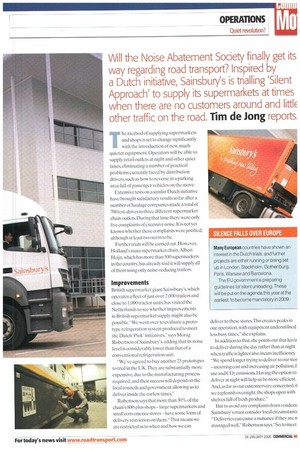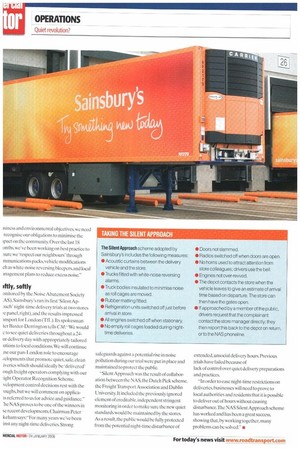Will the Noise Abatement Society finally get its way regarding
Page 49

Page 50

If you've noticed an error in this article please click here to report it so we can fix it.
road transport? Inspired by a Dutch initiative, Sainsbury's is trialling 'Silent Approach' to supply its supermarkets at times when there are no customers around and littlE other traffic on the road. Tim de Jong reports.
The method of supplying supermarkets and shops is set to change significantly with the introduction of new, much quieter equipment. Operators will be able to supply retail outlets at night and other quiet times, eliminating a number of practical problems currently faced by distribution drivers,such as how to reverse in a parking area full of passenger vehicles on the move.
Extensive tests on a similar Dutch initiative have brought satisfactory results so far after a number of haulage companies made a total of 700 test-drives to three different supermarket chain outlets. During that time there were only five complaints of excessive noise. It is not yet known whether these complaints were justified, although at least two seem to be.
Further trials will be carried out. However. Holland's main supermarket chain,Albert Heijn,which has more than 500 supermarkets in the country, has already said it will supply all of them using only noise-reducing trailers.
Improvements British supermarket giant Sainsbury's. which operates a fleet of j ust over 2,000 trailers and close to 1,000 tractor units, has visited the Netherlands to see whether improvements in British supermarket supply might also be possible. "We went over to evaluate a prototype refrigeration system produced to meet the Dutch Tick' initiatives," says Morag Robertson of Sainsbury's, adding that its noise level is considerably lower than that of a conventional refrigeration unit.
-We've agreed to buy another 25 prototypes to trial in the UK.They are substantially more expensive, due to the manufacturing process required, and their success will depend on the Local councils and government allowing us to deliver inside the curfew times."
Robertson says that more than 30% of the chain's 800-plus shops-large supermarkets and small convenience stores have some form of delivery restriction on them. `That means we are restricted as to when and how we can deliver to these stores.This creates peaks in our operation, with equipment underutilised less busy times," she explains.
In addition to that, she points out that havir to deliver during the day rather than at night when traffic is lighter also incurs inefficiency. "We spend longer trying to deliver to our stor incurring cost and increasing air pollution, f use and CO, emissions. 1-laying the option to deliver at night will help us be more efficient. And, as far as our customers are concerned, it we replenish overnight, the shops open with shelves full of fresh produce."
But to avoid any complaints from resident: Sainsbury's must consider local eircumstancx "Deliveries can cause a nuisance if they are n managed well." Robertson says "So, to meet isiness and environmental objectives, we need recognise our obligations to minimise the ipact on the community. Over the last 18 onths, we've been working on best practice to sure we 'respect our neighbours' through mmunications packs, vehicle modifications ch as white-noise reversing bleepers, and local inagement plans to reduce excess noise."
rftly, softly
onitored by the Noise Abatement Society AS), Sainsbury's ran its first 'Silent ApJach' night-time delivery trials at two stores :e panel, right), and the results impressed insport for London (TfL). Its spokesman ter Raxter-Derrington tells CM:"We would e to see quiet deliveries throughout a 24ur delivery day with appropriately tailored utions to local conditions. We will continue Ise our pan-London role to encourage velopments that promote quiet, safe, clean iveries which should ideally be 'delivered' ough freight operators complying with our ight Operator Recognition Scheme. velopment control decisions rest with the 'oughs, but we will comment on applicais referred to us for advice and guidance." lie NAS proves to be one of the winners in se recent developments. Chairman Peter keham says:"For many years we've been inst any night-time deliveries. Strong safeguards against a potential rise in noise pollution during our trial were put in place and maintained to protect the public.
"Silent Approach was the result of collaboration between the NAS, the Dutch Pick scheme, the Freight Transport Association and Dublin University. It included the previously ignored element of creditable. independent stringent monitoring in order to make sure the new quiet standards would he maintained by the stores. As a result, the public would be fully protected from the potential night-time disturbance of extended, unsocial delivery hours. Previous trials have failed because of lack of control over quiet delivery preparations and practices.
"In order to ease night-time restrictions on deliveries,businesses will need to prove to local authorities and residents that it is possible to deliver out of hours without causing disturbance.The NAS Silent Approach scheme has worked and has been a great success, showing that, by working together, many problems can be solved." •








































































































































































